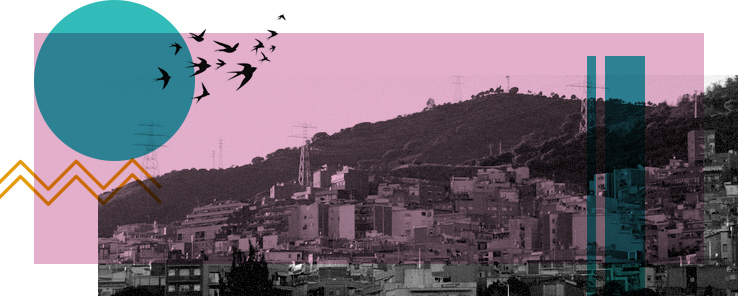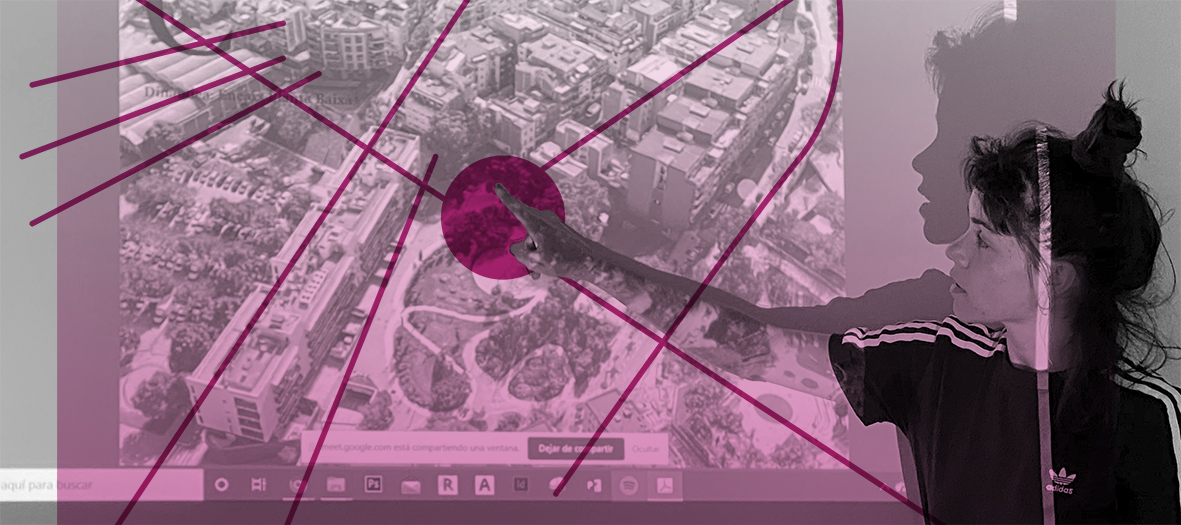
Roquetes
We are located at the Plaça de les Dones in Nou Barris, in the Roquetes area, a working class and migrant neighborhood with a long-standing tradition of social and neighborhood activism since the end of the 1960s. It is precisely thanks to this neighborhood fight, and specifically women’s activism, who endured really precarious conditions themselves, that most of the basic services in the area (paved streets, safe drinking water and sewage system, traffic lights, green areas, schools, healthcare centers, civic and cultural spaces, etc.) were achieved.
Feminism has been one of the most important fights in this district of the city. The fact that in 1976, in the context of the first Catalan Women’s Conference (Jornades Catalanes de la Dona), one of the first women’s sections of a neighborhood association was born in Nou Barris, proves this fact. At La Morada we want to honor this herstory, and we consciously stand in the memory of these fights to keep on contributing to the construction of a feminist neighborhood. Thus, our feminist perspective and activism does not end in the housing project; we are joining the existing fabric of movements and associations, sharing spaces in the neighborhood and expressing the wealth of its community life.
Neighborhood interaction
La Morada wishes to live actively in its surroundings and collaborate in its stimulation. These interactions with the neighborhood, which will need to be analyzed first and then developed during the construction process and within the architectural design of the building (sizes, ways to activate and use the community and commercial spaces), can occur in different degrees:
- With activism in neighborhood projects or the participation in consumer and exchange networks in the area.
- With other collectives, associations or agents in the neighborhood that can participate in the spaces and projects of the cooperative.
- With neighbors that can use the community spaces (multipurpose area, coworking space…) of the cooperative.
- Using part of the building’s ground floor for third sector entities or for companies promoting the social economy with a fair and affordable rent or by becoming members of the cooperative.
- Using part of the building’s ground floor for commercial use among small businesses or entrepreneur women’s projects, with an affordable and fair rent.
- Allowing the City Hall to rent part of the building’s ground floor in order to establish a local service that responds to the neighbors needs.
The current situation of the housing market, on top of the ever-increasing precarity of the lives of women and LGTBIQ+ people in our city, demands of us, both personally and politically, the need to articulate answers and provide alternatives.
A plot of land in grant of use
La Morada not only fulfills the need for housing of its members in a more or less affordable way if compared to the extremely harsh conditions of the current market, but we also join the alternatives that have been developing in the past years (La Borda, La Balma, Cirerers, just to cite some examples within the city) to promote a cooperative model. This way we are removing land from the speculative housing market and beginning to generate a real alternative to it in which sorority, learning and community are at the center.
This model is based on consolidated experiences like the Andel model in Denmark, or the Mutual Support Housing Cooperatives (Cooperativas de Vivienda por Ayuda Mutua – https://www.fucvam.org.uy/) in Uruguay.
It has two main characteristics:
- The collective ownership of the building – in vertical property – and the grant of use in a housing tenure regime in favor of the cooperative members so that they can inhabit a housing unit. This way, it’s impossible to speculate with the housing units: the members of the cooperative are not allowed to sell them in the market since the building is collectively owned by the cooperative, thus preserving its use value above its exchange value.
- The cooperative organization – people organized through the cooperative – as a way to organize both the construction of the building as well as the communal living and the building management.
This system offers three remarkable qualities for its members:
- Affordability: affordable upfront and monthly payments.
- Stability: the grant of use is offered indefinitely to the members.
- Flexibility: allowing the members to give up the grant of use and recover the upfront payment.
Besides these characteristics, the cooperative housing in grant of use model in Catalonia is also interested in reducing the environmental impact of its projects, developing passive strategies to achieve a comfortable atmosphere, as well as recycling systems and the generation of renewable energies.
At La Morada we believe that it’s the time to contribute a feminist perspective to these processes and thus enrich the experience.

